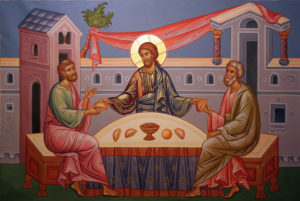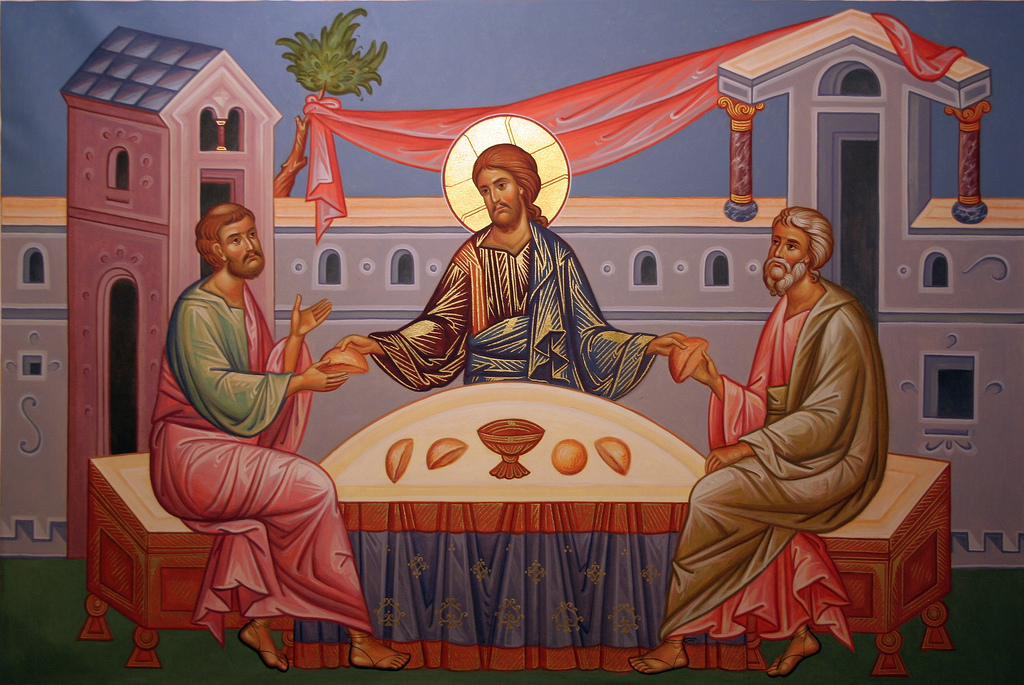
The Road to Emmaus
Devotions on Luke 24:13-35
Second Sunday in Easter
Monday, The Road to Emmaus
“Now on that same day two of them were going to a village … talking with each other about all these things that had happened” (Luke 24:13-14).
The events of the past few days had been tumultuous and confusing. A man, whom several had believed was the long awaited Messiah, had been executed by the Romans. There were reports though, by some women followers of the supposed Messiah, that his grave was empty. They claimed that he has risen from the dead. These were the topics under discussion for two followers of the condemned man, as they walked to the town of Emmaus. Through their conversation, they sought to find answers and to discover the truth, so that they might be able to determine what to do in the days ahead.
The writer of Proverbs observed, “Iron sharpens iron, and one person sharpens the wits of another” (Proverbs 27:17). The friendship and conversation of the two men, who walked to Emmaus, was important to them. Those gifts helped stabilize their faith, deal with their grief and grasp flickers of hope. Like those two disciples, our fellowship with other followers is essential to us. Life, as a follower of Jesus, is not a solo run. It is a life lived in relationships.
Lord, thank you for the fellow travelers in our lives, whom you use to enrich our walk with you. Amen.
Tuesday, The Road to Emmaus
“While they were talking and discussing, Jesus himself came near and went with them” (Luke 24:15).
The small group had been meeting for almost a year to study the Bible and pray together. Now, with the summer approaching the group had decided to take a two month break in order to accommodate everyone’s vacation and travel schedules. “I want to thank everyone for the times we have shared together,” said Susan. “I feel like I have really grown in my life of faith.” Miguel nodded in agreement. “My understanding of the Bible has increased and I’ve been able to apply its teaching to my life more effectively. “Though I’ve learned a lot,” Akihito shared, “What I really have appreciated was your prayers when I lost my job.”
Jesus appears in our lives at different times and in different places. Oftentimes, though, we recognize Jesus’ work—the work of the Holy Spirit—in those times of study, discussion and prayer that we have spent with fellow believers. We may not have sensed his presence all the time, but Jesus has been there with us.
Thank you, Jesus, that you never dessert us, even when we can’t sense your presence in our lives. Amen.
Wednesday, The Road to Emmaus
“They stood still, looking sad” (Luke 24:17).
It wasn’t a good day for the two disciples. Things weren’t going the way they thought they should and they were confused. So, they stood still and looked sad. We can understand their actions. Those days when it feels like we are swimming upstream, we often stand still and look sad. When we don’t get what we want, we stand still and look sad. Dreams may fade and our efforts may fail, when they do we stand still and look sad. We stand still and look sad even though the resurrection has occurred and Jesus is with us.
We have celebrated Easter and the resurrection of the Lord. The stanzas, “We serve a risen savior,” and “He lives!” have echoed off the walls of the sanctuaries. Though life may be hard and filled with disappointments, those are no reasons for us to stand still and look sad. Jesus has conquered death and is with us. Jesus has turned our mourning into dancing.
May your good news, Lord, overwhelm the bad news that we receive every day. Amen.
Thursday, The Road to Emmaus
“But we had hoped that he was the one to redeem Israel” (Luke 24:21).
The disciples “had hoped”–past tense. Their hope was now gone. They had hoped that Jesus was the Messiah who was going to usher in a new age. It is easy to identify with the two disciples. We’ve been in their same situation. Before the death of a loved one, we had hoped that healing and wholeness would occur. We had hoped to be offered a promotion, but it had been given to someone else.
Because of what has happened in the past, we find ourselves both hoping and doubting. While we have wrestled with our hope and our doubts, we have discovered that doubting is not the opposite of faith, but rather a part of the life of faith. Our doubts can strengthen our faith and they can direct our hopes to the one sure hope that we have—Jesus. Our hope is in Jesus who has conquered death. We hope in Jesus who has promised never to forsake us. When our hope is placed in Jesus, it never has to be past tense.
Come, Lord Jesus, come. Enter our world and be our hope. Amen.
Friday, The Road to Emmaus
“Then beginning with Moses … he interpreted to them the things about himself in all the scriptures” (Luke 24:27).
It must have been an intense Bible study as the trio walked the ten or so kilometers to Emmaus. Jesus didn’t lapse into a socioeconomic explanation of the happenings of the previous three days. Nor did Jesus attempt to explain the events from a historical perspective. Jesus dove into the scripture and linked his betrayal, torture, execution and resurrection to God’s ongoing relationship with God’s People, as recorded in the Law and the Prophets. Jesus opened up the scripture and allowed it to speak to the disciples.
God has provided us with a precious gift in the Bible. It isn’t to be worshiped, but it is to be appreciated and used. When we open its pages, the Holy Spirit speaks to us words of love, comfort, encouragement and occasionally correction. The Spirit uses the Bible, among other things, to guide us and to nurture our relationship with God and our lives of faith. It opened the eyes of the disciples as they walked to Emmaus and it opens our eyes, too.
Thank you, Lord, for your gift of the Bible. Keep us from ignoring it, and open our hearts that we may receive your words to us and act on them. Amen.
Saturday, The Road to Emmaus
“He took the bread, blessed and broke it, and gave it to them. Then their eyes were opened” (Luke 24:30-31).
Jesus’ actions were reminiscent of his at the Passover Seder that he celebrated with this disciples the previous Thursday evening. They are also identical to the early church’s communion practice. Luke’s wording is probably intentional. He wants to draw attention to the importance and power of communion. In the middle of tumultuous and confusing times, the Jesus opened the eyes of the disciples’ when they celebrated communion.
We know this to be true. Weary and burdened, we come to the Lord’s Table and are refreshed and renewed by God’s gifts of the forgiveness of sins, life and salvation. When preparing for surgery or standing by the bed of a dying loved one, Holy Communion underscores the reality of God’s presence and assures us of God’s love and grace. Faced with the challenges of our call as a member of the priesthood of all believers, The Lord’s Supper confirms that the Spirit of God goes with us. Eating the bread and drinking the wine opens our eyes just like it did the disciples on Easter eve.
When we gather together at your table, Lord, open our eyes to your love and grace, and send us on our way rejoicing. Amen.
Sunday, The Road to Emmaus
“They told what had happened on the road” (Luke 24:34).
Five year-old Ethan couldn’t wait to get home and tell his mom all that happened on his first day of kindergarten. Ethan had a lot to tell her. As the school year drew to a close, Ethan wasn’t as excited to report to his mom. Things had become routine. There really wasn’t much to tell. In following years, Ethan’s mom found herself nagging Ethan in order to get him to divulge any details of his school day.
The two disciples rush back to Jerusalem in order to tell the other disciples what had happened to them. Like the women who discovered the empty tomb, they couldn’t wait to tell others what they had discovered. Their continued fervor to share the good news with others was one of the factors that caused the Christian faith to spread.
Living as followers of Jesus, things can change from the holy to the mundane quickly. Our lives of faith become routine and we don’t think that we have anything to share with others. Combine this with the social more that states talking about religion is unacceptable, and it is easy for us to be silent about our faith. Yet, something fantastic has happened. Jesus has conquered death! Jesus lives! It is possible and it is necessary for us to share this good news with those around us. So many long to hear about God’s love and grace, and we can share it in a loving, respectful manner.
We have such good news to share, Lord. Empower us to share what you have done in a manner that can transform lives and honor you. Amen.

